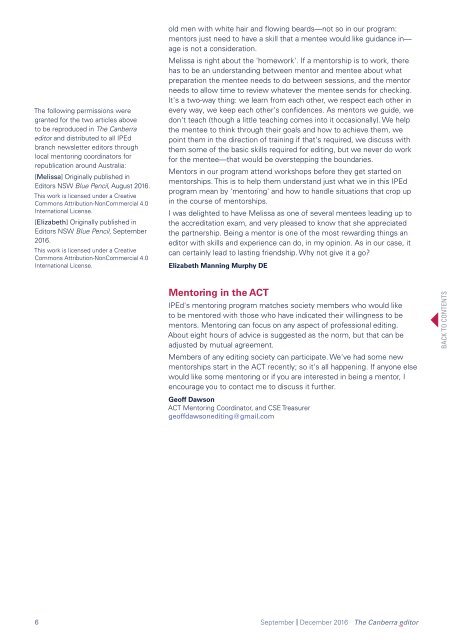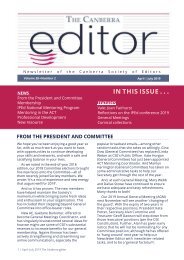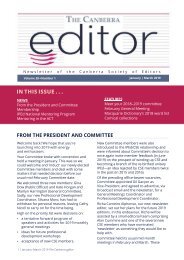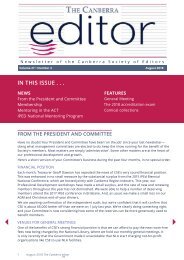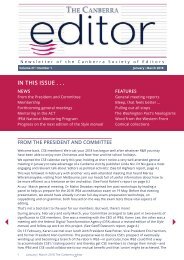The Canberr Editor: September-December 2016
Newsletter of the Canberra Society of Editors
Newsletter of the Canberra Society of Editors
- No tags were found...
Create successful ePaper yourself
Turn your PDF publications into a flip-book with our unique Google optimized e-Paper software.
<strong>The</strong> following permissions were<br />
granted for the two articles above<br />
to be reproduced in <strong>The</strong> <strong>Canberr</strong>a<br />
editor and distributed to all IPEd<br />
branch newsletter editors through<br />
local mentoring coordinators for<br />
republication around Australia:<br />
[Melissa] Originally published in<br />
<strong>Editor</strong>s NSW Blue Pencil, August <strong>2016</strong>.<br />
This work is licensed under a Creative<br />
Commons Attribution-NonCommercial 4.0<br />
International License.<br />
[Elizabeth] Originally published in<br />
<strong>Editor</strong>s NSW Blue Pencil, <strong>September</strong><br />
<strong>2016</strong>.<br />
This work is licensed under a Creative<br />
Commons Attribution-NonCommercial 4.0<br />
International License.<br />
old men with white hair and flowing beards—not so in our program:<br />
mentors just need to have a skill that a mentee would like guidance in—<br />
age is not a consideration.<br />
Melissa is right about the 'homework'. If a mentorship is to work, there<br />
has to be an understanding between mentor and mentee about what<br />
preparation the mentee needs to do between sessions, and the mentor<br />
needs to allow time to review whatever the mentee sends for checking.<br />
It's a two-way thing: we learn from each other, we respect each other in<br />
every way, we keep each other's confidences. As mentors we guide, we<br />
don't teach (though a little teaching comes into it occasionally). We help<br />
the mentee to think through their goals and how to achieve them, we<br />
point them in the direction of training if that's required, we discuss with<br />
them some of the basic skills required for editing, but we never do work<br />
for the mentee—that would be overstepping the boundaries.<br />
Mentors in our program attend workshops before they get started on<br />
mentorships. This is to help them understand just what we in this IPEd<br />
program mean by 'mentoring' and how to handle situations that crop up<br />
in the course of mentorships.<br />
I was delighted to have Melissa as one of several mentees leading up to<br />
the accreditation exam, and very pleased to know that she appreciated<br />
the partnership. Being a mentor is one of the most rewarding things an<br />
editor with skills and experience can do, in my opinion. As in our case, it<br />
can certainly lead to lasting friendship. Why not give it a go?<br />
Elizabeth Manning Murphy DE<br />
Mentoring in the ACT<br />
IPEd's mentoring program matches society members who would like<br />
to be mentored with those who have indicated their willingness to be<br />
mentors. Mentoring can focus on any aspect of professional editing.<br />
About eight hours of advice is suggested as the norm, but that can be<br />
adjusted by mutual agreement.<br />
Members of any editing society can participate. We've had some new<br />
mentorships start in the ACT recently; so it's all happening. If anyone else<br />
would like some mentoring or if you are interested in being a mentor, I<br />
encourage you to contact me to discuss it further.<br />
Geoff Dawson<br />
ACT Mentoring Coordinator, and CSE Treasurer<br />
geoffdawsonediting@gmail.com<br />
6 <strong>September</strong> | <strong>December</strong> <strong>2016</strong> <strong>The</strong> <strong>Canberr</strong>a editor


